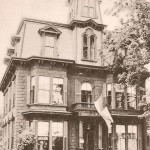Fantasia vs. Reality
The term fantasia, loosely defined, is a “work in which the author’s fancy roves unrestricted.”
The HomePort Journals evolved out of a question I’ve asked myself for most of my adult life. That question was “What if?” And much to my surprise, the answer came in the form of a book.
The Lancy Mansion at 230 Commercial Street, Provincetown, has been disfigured by an unfortunate addition that destroyed the symmetry of its Second Empire design. Although most Commercial Street real estate has been repurposed for shops, to me, this house had the furthest fall from grace. From the mid-twenties to the late ‘fifties, the house was the home of the Ladies Research Club of Provincetown, a Society of Mayflower descendants whose collection is now part of the Pilgrim Monument and Provincetown Museum. The society disbanded and museum now houses the Cortile Gallery and a sunglass shop.
I’ve been fascinated by the house since my first visit to Provincetown in 1968 and have wondered for decades, “What if the house had been further out of town, and the family had continued to live in it?” So in The HomePort Journals I moved the Lancy Mansion to the far West End of town, surrounded it by enough land to make it an estate, and imagined an elderly recluse (Lola Staunton) as its chatelaine. From there it was simple enough to create a scandal that forced her into seclusion, a runaway gay man who found his way into her life, and a sexy, brooding love interest to make his trip worthwhile.
When I first came to Provincetown in 1987, my neighborhood was home to a number of charming, elderly, Portuguese women. In fact, the woman next door lived to be 103. When I moved into my current home in 1997, our lane was watched over by four elderly women who waited at their windows for me to arrive every Friday night. If I was even twenty minutes behind schedule, I’d hear about it the next day. I was called “Dahlin’” from the day I moved in and found warmth, affection, and acceptance I had never anticipated. In one sad year, three of the four women passed on, and after that everything about the neighborhood changed. Now the last one is gone, and I’m the one who calls folks Dahlin’.
The salty language of one of these women and the gruff way in which she faced life’s challenges stayed with me. So did the ease I felt around her—and I wasn’t the only one. When her TV died, the gay men in the neighborhood pitched in to buy her a new one, and we chipped in to pay her oil bill so she could stay warm. (She never realized the true cost of oil for the last few years of her life.) These are just two examples of a special bond that once existed in Provincetown between a gay man and older Portuguese woman, though as the years pass I see it less and less.
Eventually I asked, “What if that tradition had lived on?,” and the answer to that question was Dorrie Machado, Lola’s crusty childhood friend who takes Marc Nugent under her wing when he flees an abusive relationship. Dorrie’s character wrote itself as memories of the “ladies of the lane” flowed down my arm and onto the page. It’s been a joy to capture the essence of our extraordinary friendship in what I’ve called a “Provincetown Marriage.”
The first fall I lived in Provincetown, I attended a service at the Unitarian Church. I was so warmly welcomed by the tiny congregation, I returned the following week to find there wasn’t an empty seat in the place. They were filled by ladies in all sorts of outfits—poodle skirts, mini’s, fun furs—and, the dead giveaway—size thirteen pumps. Unbeknownst to me, it was Fantasia Fair, the international transgender event now in its fourth decade and the service was one of many small town rituals to which the ladies of Fantasia fair brought their unique appreciation.
That week, the town was filled with “Tall Ships,” as these ladies are still affectionately known. I savored the positive energy that came from their appreciation for the simplest things: a smile on the street, a conversation at the cash register, a compliment on a choice of wardrobe. That energy filled the town until everyone, gay, straight, or transgender was smiling at each other like old friends.
I remember as if it were yesterday watching four “ladies” get into their car at the end of what had been a wonderful, liberating week. To a person, their features fell, their masculinity resurfaced, and, as they departed, I imagined a regret-filled return to lives marked by oppression and constraint. Seeing what seemed like dread on the face of the driver, I asked myself, “What if they didn’t have to go back and could live year-round the way they have this week?”
Decades later, Helena Handbasket, the cross-dressing, heroic, and loving housekeeper of the HomePort estate, arrived in answer to that question. Her fierce loyalty to her family of choice, and her staunch pursuit of true love took over the tale. For me, and I suspect other gay men, Helena tapped into an inner world where love and acceptance are sought beyond all else. I found strength in Helena’s persistence and admiration for those who live their life without regard for the opinions of others. In some ways, she’s affected me most of all my characters. Perhaps it’s Helena, perhaps age, perhaps almost thirty years of living in Provincetown, but I care much less these days about what others think.
As the book evolved, I found myself asking one last question. “What if this incongruous group of characters overcame the traditional barriers of age, sexual preference, and prejudice to become a family?” Armistead Maupin—one of my favorite authors—has coined the phrase “logical family.” While gay folks (or anyone else for that matter) have little say over their biological family, he’s captured in a single word how we often create a family of our own to compensate. And so, the characters in The HomePort Journals came to love each other as family, and something inside me changed as well. I found, almost without realizing it, I am blessed with friends of all ages who had become my own, loving, logical family.
The Lancy Mansion may never return to its glory days, the wonderful old ladies of Provincetown have, for the most part, passed on, and the other “ladies,” those of Fantasia Fair, still depart each October at the end of their magical week. Even though secure in the love of my logical family, I still grapple with the sorry state of the world these days. When things seems inevitable and the world a bit too harsh, I simply let my thoughts “rove unrestricted” to the world of HomePort, where, as you’ve probably guessed, there’s a sequel in the works.
The HomePort Journals will be on sale March 18th from Wilde City Press,
March 27th from Amazon.
- A. C. Burch On Writing - December 15, 2017
- Join Me at the 2nd Annual Provincetown Book Festival Sept 15 & 16th 2017 - September 12, 2017
- Provincetown Heroes - May 28, 2017




Leave a Reply
Want to join the discussion?Feel free to contribute!